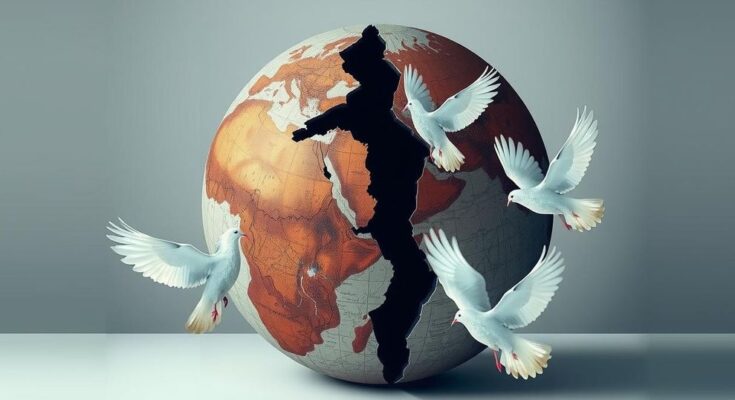Protests in Kinshasa highlight accusations against Rwanda for supporting M23 rebels in Goma. UN experts have identified Rwandan military training and assistance as crucial to M23’s gains. The conflict, rooted in historical tensions and economic interests, complicates regional dynamics and raises significant security concerns for both countries.
Protesters in Kinshasa, the capital of the Democratic Republic of Congo (DRC), demonstrated against Rwandan President Paul Kagame, blaming him for the backing of M23 rebels who have taken control of Goma. According to a report from UN experts, Rwanda’s military has significant involvement in M23 operations, which includes training recruits and providing advanced weaponry.
Goma, a vital city for trade and humanitarian efforts, has become a refuge for approximately two million people fleeing violence between M23 rebels and the Congolese army. Recent fighting has led to widespread casualties amid disrupted communications and utilities, with M23 reportedly having gained substantial control over the city.
UN peacekeeping chief Jean-Pierre Lacroix confirmed the presence of Rwandan troops in Goma, although specific numbers are difficult to ascertain. The Congolese military has faced significant challenges, with some soldiers surrendering and crossing into Rwanda for safety. Despite prior denials, evidence increasingly suggests a connection between Rwandan support and M23’s actions.
The M23 group, representing the minority Tutsi community, has emerged amid complex historical tensions dating back to the Rwandan genocide in 1994. Kagame’s government perceives the armed Hutu group, still active in eastern DRC, as a significant threat. Recent comments from Kagame highlight the perceived failure of Congolese leadership to address these security concerns, complicating the conflict.
The M23’s strategic targeting of Goma appears to be more politically motivated rather than operationally necessary, given that they control more lucrative territories. Reports indicate Rwanda’s strategic interest in maintaining influence in North Kivu and countering Hutu militia threats.
Rwandan military presence and aid to the M23 have been substantiated by evidence including the training of recruits in tactics and warfare. Despite Rwanda’s denial of child soldier use, UN experts report significant growth in M23’s military strength, supported by Rwandan troops and sophisticated weaponry.
Rwanda’s ally, Uganda, has also been implicated in supporting M23 and may share concerns about the group’s increasing threat level. The resurgence of M23 in 2021 aligns with Rwanda’s frustrations towards Congolese governance, which has not sought closer military cooperation against mutual threats.
Geolocated images have placed Rwandan troops close to Goma, confirming their involvement in the region. M23’s control over resources such as coltan—used in technology—has further funded their operations, illustrating the link between economic interests and regional stability.
Reported military advancements, including the use of advanced weaponry, have enabled M23 to make considerable territorial gains. UN reports document the use of military technology, including anti-tank guided missiles and GPS interference capabilities, indicating organized support from Rwandan forces.
While Kagame dismisses UN findings, asserting they are exaggerated, efforts by the East African Community to mediate have met resistance. Kagame maintains that discussions must center on Hutu militias as the primary concern affecting DRC’s security, emphasizing the importance of addressing these long-standing issues.
The ongoing conflict in the eastern Democratic Republic of Congo (DRC) has historical roots tied to the Rwandan genocide of 1994. Tensions arise from the presence of Hutu militia groups in DRC, which pose security risks for Rwanda. Over the years, M23 has claimed to defend the interests of the Tutsi community in DRC, further complicating the regional dynamics and influencing Rwanda’s military involvement. The situation is exacerbated by the extensive mineral wealth in the region, which has prompted various armed factions to vie for control.
The evidence suggests significant Rwandan military support for M23 rebels operating in the DRC, raising tensions between Congo and Rwanda. This involvement, amidst historical grievances, underlines the complexity of the conflict, which not only encompasses military issues but also economic interests tied to the region’s abundant resources. The ongoing instability illustrates the challenges facing regional peace and security efforts, indicating a need for comprehensive dialogue to address underlying causes.
Original Source: www.bbc.com




